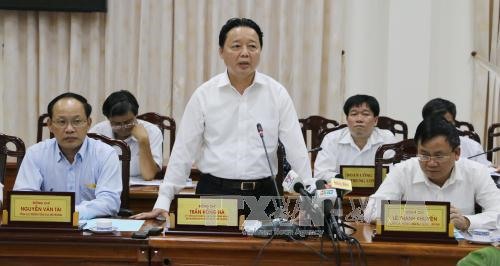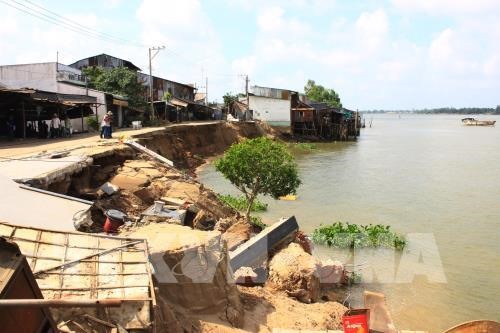 Society
Society

An Giang Province wants the Ministry of Natural Resources to help frame housing policies that will enable the relocation of 20,000 families living in landslide-prone areas in the next five years.
 |
| Minister of Natural Resources and Environment Trần Hồng Hà at a meeting with An Giang authorities on April 25.—VNA/VNS Photo Công Mạo |
AN GIANG – An Giang Province wants the Ministry of Natural Resources and Environment to help frame housing policies that will enable the relocation of 20,000 families living in landslide-prone areas in the next five years.
The petition was made at a meeting on Tuesday with a group of ministry officials led by Minister Trần Hồng Hà held to discuss the severe landslides along the Vàm Nao River.
The province also sought financial aid to repair the damage caused by landslides over the last couple of years.
According to Trần Đặng Đức, director of the An Giang Department of Natural Resources and Environment, 38 landslides occurred along riverbanks in the last two years, destroying 142 houses and other properties and causing losses of more than VNĐ100 billion (US$ 4.4 million) each year.
Some 162km of the province’s 400km of riverbanks are vulnerable to landslides, and 20,000 households live on them.
The landslide along the Vàm Nao River in Chợ Mới District on April 20 is estimated to have caused losses of VNĐ9 billion ($396,400).
Since then 107 households have been evacuated from vulnerable areas.
Đức dismissed some experts’ contention that excessive mining of sand was to blame for the disaster, saying there was no such activity in that area.
He called on the ministry to study the flows of the Tiền and Hậu rivers to preclude more such disasters.
Hà hailed the province’s efforts to relocate families and prevent human losses, and promised to convey its suggestions to the Government.
But he also instructed the Việt Nam Environment Administration, which functions under his ministry, to review all sand mining projects in the Mekong Delta and assess their environmental impact.
Earlier, Deputy Prime Minister Trịnh Đình Dũng has instructed authorities in An Giang to monitor the situation and ensure no further mishaps occur at the site of the landslide.
He told them to move people out of dangerous areas, restrict the number of vehicles and people travelling through the affected area, and investigate the cause of the landslide.
He instructed the Ministries of Agriculture and Rural Development, Natural Resource and Environment, Planning and Investment, and Finance and An Giang Province to identify the cause of the disaster, provide relief to the affected people and ensure the safety of others living in the vicinity.
The landslide, which occurred in Mỹ Hội hamlet, has left a crater 380m long, 120m wide and 42m deep.
No one was killed possibly because the authorities forced people in the 14 houses to evacuate after their neighbours discovered the danger and informed them.
Chợ Mới District authorities have identified 200 land plots for relocating people living along the river, and will build a new road to the area.
“An Giang Province has three solutions: changing the river’s flow in places where there have been severe landslides, identifying land plots to resettle people living in vulnerable areas and refusing permission for houses in vulnerable areas,” Trần Anh Thư, director of the province Department of Agriculture and Rural Development, said.
Sand mining
There are 265 highly vulnerable spots in the Mekong Delta where landslides have caused the loss of 500 hectares.
The situation has been blamed on overexploitation of sand.
An Giang has issued licences to eight enterprises to mine sand in areas ranging from 21 to 99 hectares for one to eight years.
They include two in Mỹ Hội Đông Commune, who have licences to mine 60ha.
Prof Dr Lê Anh Tuấn, deputy head of Cần Thơ University’s Mekong Delta Climate Change Institute, told Thanh Niên (Young People) newspaper that when sand is mined and removed from a river, there is nothing to absorb the energy of the water and the gushing waters cause landslides on the shore.
Biologist Nguyễn Hữu Thiện said: “When upstream localities mine sand, it causes landslides downstream. In the coming time there will be more 11 hydropower dams on the Mekong River and no sand will come to the Mekong Delta. Landslides will become more severe.”
Dr Dương Văn Ni of Cần Thơ University’s environment and natural resources faculty said: “We need to do a general survey of the entire delta to mitigate the landslide problem.” —VNS
 |
| The site where the bank of the Vàm Nao River in An Giang Province’s Chợ Mới District slid into the water.—VNA/VNS Photo Công Mạo |




